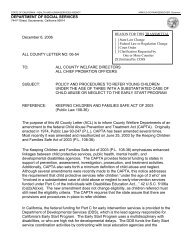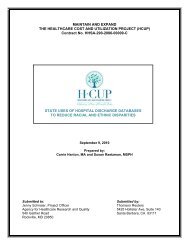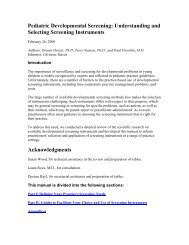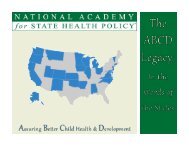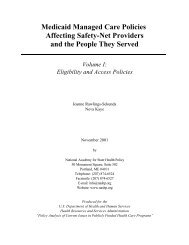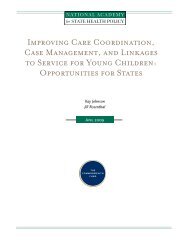Developing Federally Qualified Health Centers into Community ...
Developing Federally Qualified Health Centers into Community ...
Developing Federally Qualified Health Centers into Community ...
Create successful ePaper yourself
Turn your PDF publications into a flip-book with our unique Google optimized e-Paper software.
populations. This report features three such collaborations, which offer important lessons<br />
for states to consider as they work to improve their primary care delivery systems.<br />
Montana <strong>Health</strong> Improvement Program<br />
In 2009, Montana Medicaid shifted its management of complex patients from an out-ofstate<br />
disease management vendor to 13 FQHCs and one tribal health center in the state.<br />
The agency collaborated with the Montana Primary Care Association to develop a <strong>Health</strong><br />
Improvement Program (HIP) in which Medicaid pays these health centers $3.75 per<br />
member per month to hire care managers to serve beneficiaries. Approximately 90<br />
percent of the Medicaid patients served through this program receive their primary care<br />
from a private, non–health center provider.<br />
Patients are identified for HIP care management through predictive modeling<br />
software and provider referrals, based on their risk for complications or inappropriate<br />
utilization of services. Trained HIP care managers, based at the health centers, coordinate<br />
care with patients and their providers either by meeting patients face-to-face or by telephone.<br />
They teach self-care skills, review medications, manage transitions between care settings,<br />
remind patients of upcoming appointments, and often arrange transportation.<br />
Relationships between the FQHCs and private practices have been evolving over<br />
the past two years. Although data collection is limited, Montana Medicaid has been able<br />
to show cost savings from the program through better management of chronic conditions<br />
and avoidance of acute care utilization. In addition, the state has been able to extend care<br />
management services to a broader Medicaid population.<br />
<strong>Community</strong> Care of North Carolina<br />
Over the past 13 years, North Carolina Medicaid has cultivated a robust system that has<br />
grown from an initial pilot of eight community networks to a statewide operation of 14<br />
<strong>Community</strong> Care of North Carolina (CCNC) networks covering all 100 counties. The<br />
state Medicaid agency left the network design in the hands of large Medicaid practices<br />
but provides payments to the participating private practices and networks, which vary<br />
according to the size of the population served.<br />
One large practice, Gaston Family <strong>Health</strong> Services, an FQHC, partnered with the<br />
public health department and a community hospital to form an affiliated nonprofit<br />
network, <strong>Community</strong> <strong>Health</strong> Partners. Gaston Family <strong>Health</strong> Services provides the<br />
management and staffing for 25 employees to operate the <strong>Community</strong> <strong>Health</strong> Partners<br />
network. Network staff members include a medical director, network manager, nurse<br />
viii



